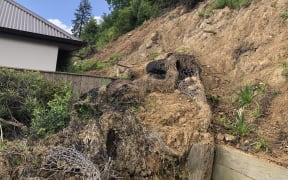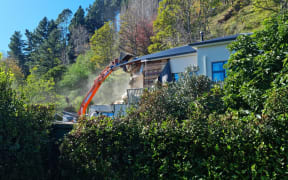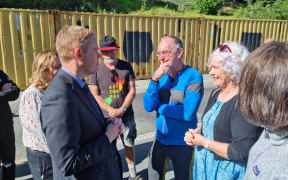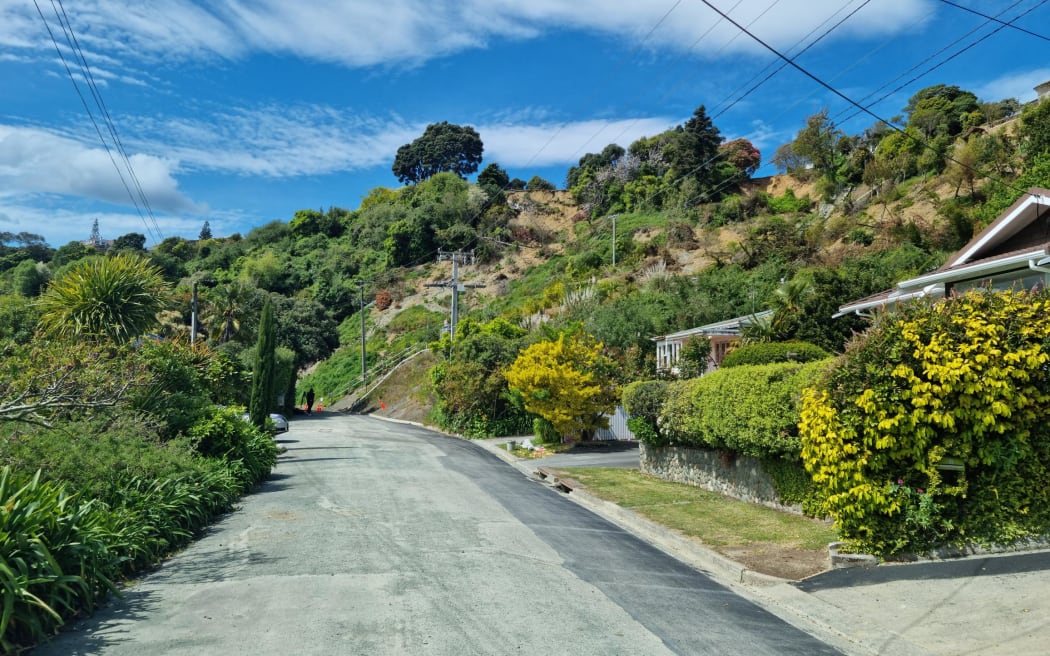
Grenville Terrace in Nelson in 2022, with slip damage visible. Photo: RNZ/ Samantha Gee
Nelson City Council staff and elected members have raised concerns that accepting a property buyout deal from the government for slip-affected homes will set a precedent in future natural disasters.
Earlier this month, the government offered the council a $12.3 million support package to help with the recovery from the August 2022 floods.
Of that, $6m was earmarked for property buyouts in a 50/50 cost-sharing deal with the council.
Councillors unanimously agreed in principle to the cost-sharing package on Thursday, subject to a report detailing the implications and future cost to council.
Mayor Dr Nick Smith said agreeing to the government deal was the right thing to do, as there were no practical alternatives for dealing with the affected properties.
Fourteen homes have been identified as being not safe to live in due to landslide risk, with the cost to remediate the land, more than the property's value.
Smith said given council had previously approved resource and building consents for those homes, it had a social responsibility to do right by the owners.

Nick Smith. Photo: RNZ / Rebekah Parsons-King
"I worry about the heartache for these families that have been left out, and now more than a year after the storm they still have their lives in limbo and I do want us to resolve this quite quickly."
He said five councils in the North Island had accepted a similar deal after Cyclone Gabrielle with far bigger challenges, and not accepting the deal would mean Nelson was less supportive of its residents.
But many around the council table raised concerns about setting a precedent for future buyouts, and what it would mean for the council to own properties with an ongoing landslide risk.
Council chief executive Nigel Philpott said he did not yet know if $12m would cover the cost of buying out the 14 properties, as he was waiting on advice from staff, but he was "deeply worried" about the precedent it could set.
"If we buy these properties, this land, we inherited a potential landslip for the future that could happen in five years, 10 years, 20 years… so you, as elected officials, have to make a decision with your eyes wide open and understand what we may be open to.
"It's a gnarly problem, it's a difficult one, and I want to bring you the full facts before you make a decision."
Councillor Aaron Stallard said the issue was the start of a nationwide discussion about retreat, and how to handle properties damaged in natural disasters.
"Where does the responsibility lie between the homeowner's insurance, EQC, local and central government?"
Stallard said there were people who needed help in the short-term, but policy was needed to guide these decisions in the long-term.
"I do think we do have moral obligation, [but] we also want to avoid moral hazard… when someone undertakes more risk than they might otherwise because they believe another party is going to bear the cost of that risk if something goes wrong."
Councillor Rachel Sanson said the council needed to engage with the community on how it planned to retreat from vulnerable areas, in the face of more frequent severe weather events.
"What we are doing here is precedent setting and I think that we need to be making these decisions with plenty of information and also with the community voice at the table."
Councillor Tim Skinner said while the council had an obligation to put right properties damaged by slips on council land, he struggled with the idea of buying out properties affected by slips from private land.
"We've been put in a difficult decision, we are damned if we do, damned if we don't."
Deputy mayor Rohan O'Neill Stevens said the matter was deeply emotive and personal, but that elected members needed to look at the wider implications of accepting the deal.
"I have no qualms in saying that as a community, we should care for one another and support one another as much as possible, but we also need to make sure that within these conversations, we're looking at the future, because there will be precedent set."
He said there was an urgent need for a national strategic framework for dealing with properties no longer safe to occupy after severe weather events.
"We don't want to see homes sitting there unoccupied, degrading away, that is not a positive outcome. The question is, how do we get to the best outcome? How do we ensure the equitable spread of those costs and how do we make sure that government coming to the party is not a one off, and that our community can pay for the future events that we know we will see?"
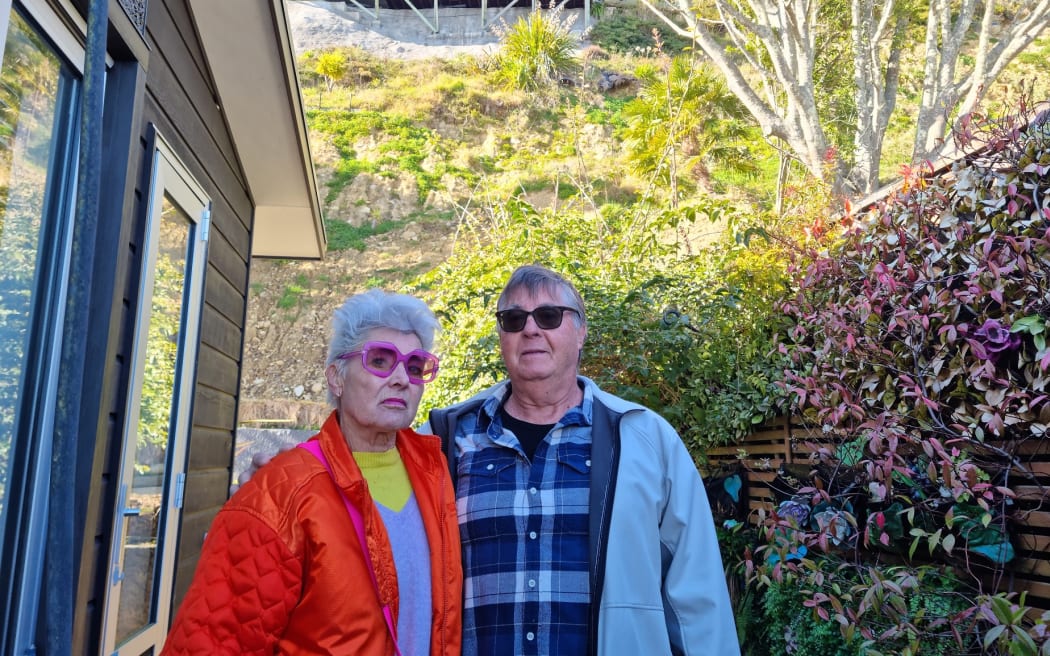
Julie Ambrose and Geoff Moffett with the exposed slope behind their home. Photo: RNZ / Samantha Gee
Red-stickered homeowner Geoff Moffett said he was relieved when the government came through with the buyout deal, but this further delay felt like another kick in the guts.
"I wasn't certain that the council would just go ahead and rubber-stamp it, but there's a lot of opposition in that council room… and we just don't feel that, that perhaps the councillors understand the situation, the ramifications.
"Every other council in the country that is in this situation has voted unanimously for this government deal, why not Nelson? Are they going to be the pariah in this?"
Andy Kenton, whose home was also red-stickered, said he understood the council's concerns, but he remained hopeful of a resolution.
"It's been a lot of work to get to this point. We had to ask central government, did Nelson matter? And they finally decided that yes, it did, and now we're hoping that Nelson City Council will say the same."
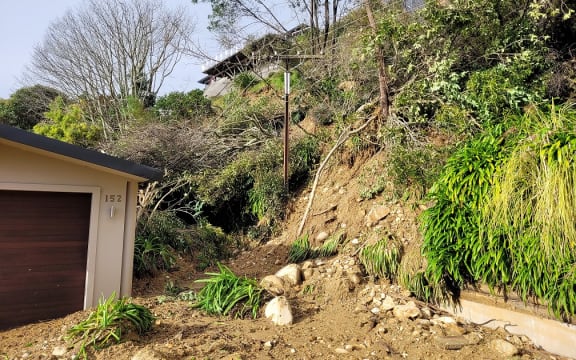
Mud and debris behind Andy Kenton's house following the 2022 August floods. Photo: Supplied / Andy Kenton
Kenton said the legislation needed to change to prevent people from ending up in this situation in the future.
"Put simply, if you can't re-enter your house and you've been paying your insurance, but the insurance money will only cover damage and you'll never get a red placard removal, then surely that should automatically be an insurance write off."
A final decision on whether to accept the government's offer will be made at the council meeting next month.


